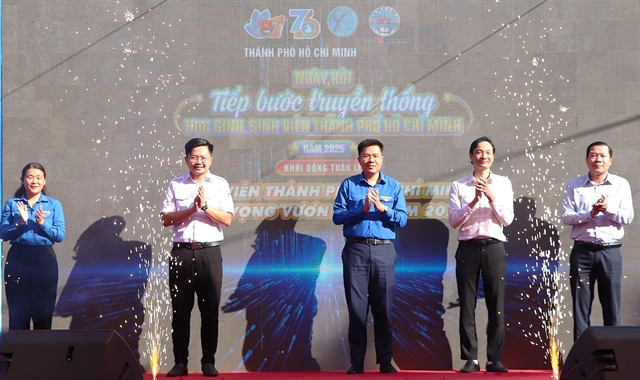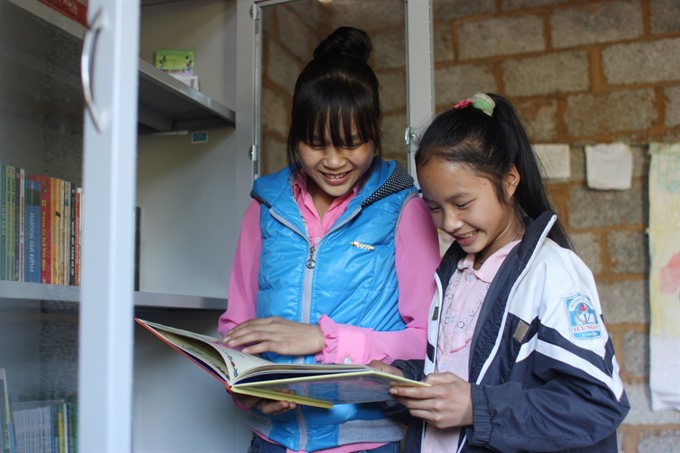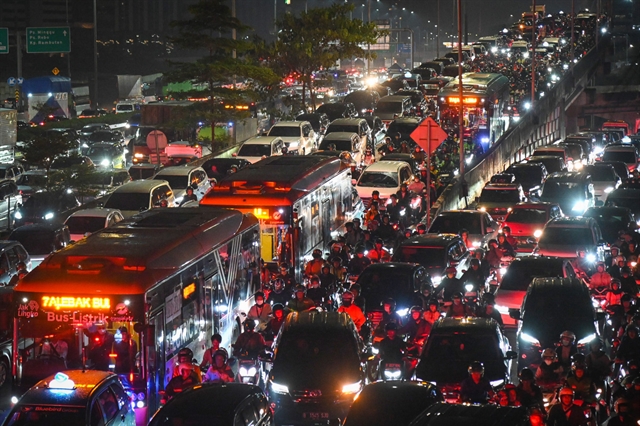

There are not many good books for people to read in rural areas, especially children’s story books. This has meant that many young people grow up not reading like they should.
 |
| A new page: Children enjoy reading books at a library in the northern province of Cao Bằng. Photo childfund.org.vn |
There are not many good books for people to read in rural areas, especially children’s story books.
This has meant that many young people grow up not reading like they should.
The Library Department has been working towards fixing this problem.
Library cars carrying books have been visiting provinces like Sơn La, Quảng Nam, Nghệ An, Gia Lai and An Giang to get books to more people who live far from towns and cities.
Bùi Thị Phượng of Nghĩa Lộ Town in the northern province of Yên Bái, wanted a collection of stories to gift her daughter on her birthday.
However, she was unable to find the perfect gift despite wandering around book stores in the town for several hours.
There were stories selling text books, but almost none had literature on their shelves.
“I then had to ask for help from a friend in Hà Nội to buy a collection of books for my daughter,” she said.
The paucity of literature works is not confined to Nghĩa Lộ Town. This is common to rural and mountainous areas all over the country.
Thọ Xuân District in the central province of Thanh Hóa is a place with a higher standard of living in comparison with other localities in the province, but there are just six private book stores offering new and old textbooks as well as stationery. Store owners said locals seldom ask for children’s story books, so there is no point keeping them.
At a recent conference on books for children in rural and mountainous areas, experts said there were 100 publishers throughout the country and 13,700 book stores and book centres, and nearly 300 private publishing companies. However most of the companies were based in large cities and remote areas had very few publishing units.
Phạm Thế Khang, Chairman of the Việt Nam Library Association, said it was sad that not only had the book distribution network become smaller and smaller in rural and mountainous areas, libraries at rural schools were offering only textbooks.
“And they don’t even have enough textbooks to lend to local pupils for study,” he said. “The other source of books – the public library – is uncommon.”
Vũ Dương Thúy Ngà, head of the Library Department under the Ministry of Culture, Sports and Tourism, admitted that public and school libraries in mountainous areas lacked books.
“One reason for this is that these libraries are rarely able to afford to update their inventory with more literature books,” she said, “Besides, the national programme on supplying books for district libraries in remote and offshore areas has ended.
“The shortage has also resulted in local youth not caring about developing a reading habit,” Khang said. “That has created a larger gap between urban and rural, plain and mountainous areas. This is a loss that cannot be compensated for children in the affected areas.”
Several solutions
Ngà said the first measure the Library Department has taken to tackle this situation was to move more and more books from provincial and district public libraries in the plains to remote and mountainous areas.
Some localities such as Yên Bái and the southern province of Đồng Tháp, have organised mobile libraries to serve children in remote areas.
Last year, the department established a project to open mobile libraries in cars, funded by private sources. As many as five such cars have reached five provinces. Carrying both books and computers, these vehicles have been a boon for children in remote areas.
Many people and groups have volunteered to bring books to needy children. The most active project among these is Sách Hóa Nông Thôn (Books for Rural Areas), initiated by Nguyễn Quang Thạch. For more than 10 years, Thạch and his colleagues have set up nearly 10,000 book cases in various provinces and cities.
The Tủ Sách Lam Sơn (Lam Sơn Bookcase) project by intellectuals and the business community from Thanh Hóa has also supported schools in setting up bookcases in their classrooms.
A group of businessmen from Hải Hậu District in Nam Định Province has launched a programme to set up 12,662 bookcases in Nam Định. The aim is to supply enough books to 10 districts in the province, benefiting children from kindergartens to high school students.
After retiring, Hà Duyên Sơn, former headmaster of the Thọ Xuân High School in Thanh Hóa, used his family’s book collection to set up the Hà Duyên Đạt Private Library that has more than 2,500 books of all genres for all ages.
The library is free and it currently has 500 regular readers.
“Each day, the library receives up to 50 visitors who read there or borrow books to take home,” Sơn said.
Ngà said the State and individuals joining hands to bring more books to remote areas had encouraged the love for books among children.
“It helps children learn better and become substantial citizens of the locality in the future,” she said. — VNS
GLOSSARY
There were stories selling text books, but almost none had literature on their shelves.
Literature is made up of things that have been written but it mostly means books that are considered to be good reading.
The paucity of literature works is not confined to Nghĩa Lộ Town.
If there is a paucity of literature there is not much of it.
“Not confined to Nghĩa Lộ Town” means “not only in Nghĩa Lộ Town”.
This is common to rural and mountainous areas all over the country.
If something is common to rural areas, it happens a lot in rural areas.
Rural areas are country areas.
Thọ Xuân District in the central province of Thanh Hóa is a place with a higher standard of living in comparison with other localities in the province, but there are just six private book stores offering new and old textbooks as well as stationery.
Standard of living means lifestyle.
“In comparison” means “compared with”
Books that you write in, pens, pencils, rulers and so on are all stationery.
Store owners said locals seldom ask for children’s story books, so there is no point keeping them.
“Seldom” means “not often”.
Point, in this case, means purpose.
At a recent conference on books for children in rural and mountainous areas, experts said there were 100 publishers throughout the country and 13,700 book stores and book centres, and nearly 300 private publishing companies.
Publishers are people who make it possible for books to be produced.
Phạm Thế Khang, Chairman of the Việt Nam Library Association, said it was sad that not only had the book distribution network become smaller and smaller in rural and mountainous areas, libraries at rural schools were offering only textbooks.
A distribution network is a group of people who are available to take a product to many different places.
“The other source of books – the public library – is uncommon.”
A source is a place where things come from.
Vũ Dương Thúy Ngà, head of the Library Department under the Ministry of Culture, Sports and Tourism, admitted that public and school libraries in mountainous areas lacked books.
To lack something means to not have it.
“One reason for this is that these libraries are rarely able to afford to update their inventory with more literature books,” she said, “Besides, the national programme on supplying books for district libraries in remote and offshore areas has ended.”
Rarely means not often.
An inventory is a record of what you may have stored away.
“The shortage has also resulted in local youth not caring about developing a reading habit,” Khang said.
A habit is something you do regularly that may become hard to give up.
“This is a loss that cannot be compensated for children in the affected areas.”
Compensated means “made up for”.
Ngà said the first measure the Library Department has taken to tackle this situation was to move more and more books from provincial and district public libraries in the plains to remote and mountainous areas.
To tackle a situation that is a problem means to face up to it and sort it out .
Some localities such as Yên Bái and the southern province of Đồng Tháp, have organised mobile libraries to serve children in remote areas.
If something is mobile it can move around.
Carrying both books and computers, these vehicles have been a boon for children in remote areas.
Something that is a boon is helpful.
Many people and groups have volunteered to bring books to needy children.
To volunteer for something means to be willing to work without being paid.
The most active project among these is Sách Hóa Nông Thôn (Books for Rural Areas), initiated by Nguyễn Quang Thạch.
Initiated means begun.
The Tủ Sách Lam Sơn (Lam Sơn Bookcase) project by intellectuals and the business community from Thanh Hóa has also supported schools in setting up bookcases in their classrooms.
Intellectuals are clever people.
A group of businessmen from Hải Hậu District in Nam Định Province has launched a programme to set up 12,662 bookcases in Nam Định.
Launched means started.
The aim is to supply enough books to 10 districts in the province, benefiting children from kindergartens to high school students.
If you benefit from something, it does you good.
Kindergartens are nursery schools.
After retiring, Hà Duyên Sơn, former headmaster of the Thọ Xuân High School in Thanh Hóa, used his family’s book collection to set up the Hà Duyên Đạt Private Library that has more than 2,500 books of all genres for all ages.
A former headmaster is someone who was once a headmaster.
A genre is a category of art.
The library is free and it currently has 500 regular readers.
Currently means now.
“It helps children learn better and become substantial citizens of the locality in the future,” she said.
Substantial citizens are solid citizens, in other words good people.
WORKSHEET
Find words that mean the following in the Word Search:
c | i | m | o | y | t | u | j | s | g | u | d |
h | t | b | s | b | l | b | d | n | f | e | l |
u | p | h | i | f | p | y | a | j | o | c | p |
r | a | b | i | k | r | s | r | t | u | o | s |
b | h | v | b | o | a | i | s | z | r | l | c |
a | e | h | h | u | m | x | e | h | c | e | a |
n | c | h | a | i | r | m | a | n | e | b | p |
g | f | u | m | o | b | i | l | e | d | c | m |
b | r | q | v | h | l | x | d | k | r | f | m |
u | i | w | c | a | p | i | t | a | l | d | r |
© Duncan Guy/Learn the News/ Viet Nam News 2017
1. Friend; 2. Six; 3. Chairman; 4. Mobile; 5. Urban.




